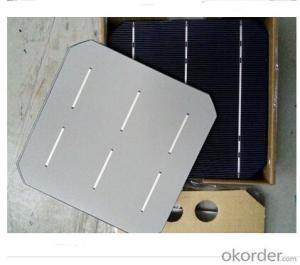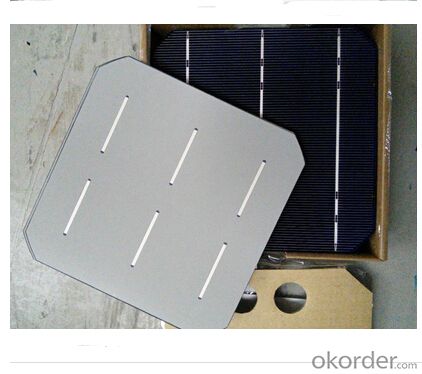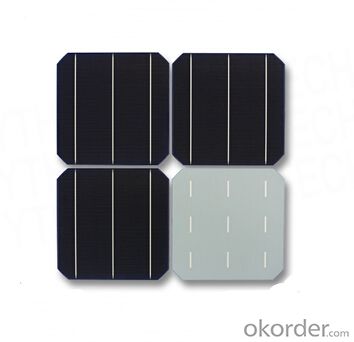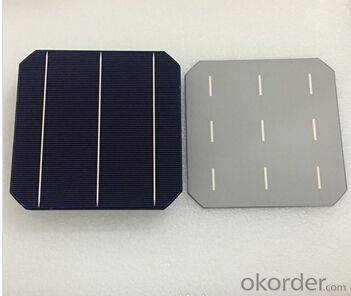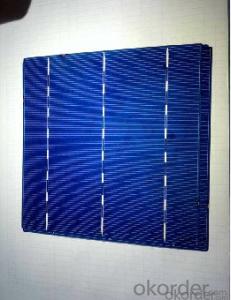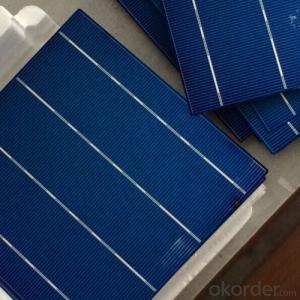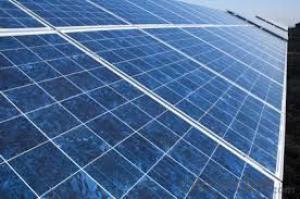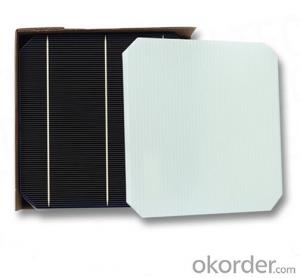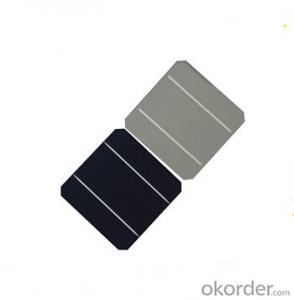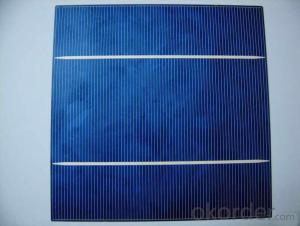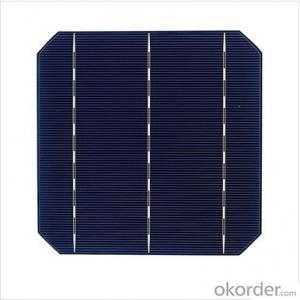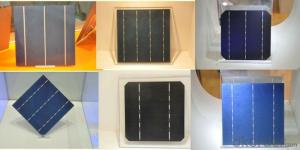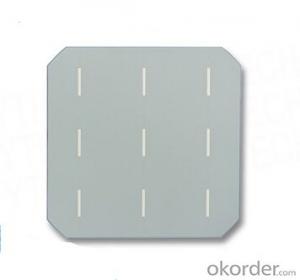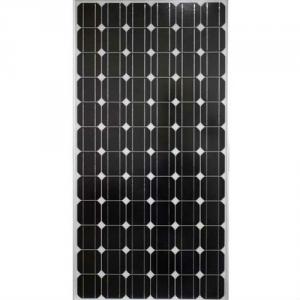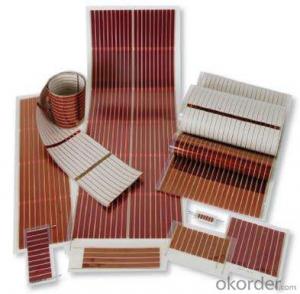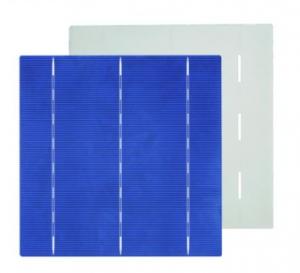Topcon A Grade 16.6% Monocrystalline Solar Cells
- Loading Port:
- Shanghai
- Payment Terms:
- TT OR LC
- Min Order Qty:
- 5000 pc
- Supply Capability:
- 80000 pc/month
OKorder Service Pledge
OKorder Financial Service
You Might Also Like
Monocrystalline Solar Cells A GRADE:
Solar cells is made by solar wafer, it has three categories of solar cell right now, monocrystalline polycrystalline and thin film,These cells are entirely based around the concept of ap-n junction, which is the critical part of solar module, it is the part that can convert the light energy into electricity, the thickness is from 180um to 200um, with even busbars to conduct electricity, textured cell can decrease diffuse reflection; they are often electrically connected and encapsulated as a module. Photovoltaic modules often have a sheet of glass on the front (sun up) side, allowing light to pass while protecting semiconductor wafers from abrasion and impact due to wind-driven debris, rain, hail, etc. Solar cells are also usually connected in series in modules, creating an additive voltage. Connecting cells in parallel will yield a higher current;With high quality and stable quality. Our Cells can greatly improve the performance of Solar Modules.
Monocrystalline Silicon Solar Cells A GRADE Advantage:
• High efficiency and stable performance in photovoltaic conversion.
• Advanced diffusion technique ensuring the homogeneity of energy conversion efficiency of the cell.
• Advanced PECVD film forming, providing a dark blue silicon nitride anti-reflection film of homogenous color and attractive appearance.
• High quality metal paste for back surface and electrode, ensuring good conductivity, high pulling strength and ease of soldering.
• High precision patterning using screen printing, ensuring accurate busbar location for ease with automatic soldering a laser cutting.
Specifications of Monocrystalline Solar Cells
Efficiency (%) Pmpp (W) Umpp (V) Impp (A) Uoc (V) Isc (A) |
18.20% 4.43 0.536 8.263 0.634 8.712 |
18.00% 4.38 0.535 - 8.188 0.633 8.701 |
17.80% - 4.33 0.534 - -8.112 ---0.632 ----8.652 |
17.60% 4.28 0.533 8.036 0.631 8.641 |
17.40% 4.23 0.529 8.005 0.630 8.591 |
17.20% 4.19 0.525 7.973 0.627 8.542 |
17.00% 4.14 0.522 7.926 0.624 8.495 |
16.80% 4.09 0.518 7.893 0.620 8.452 |
16.60% 4.04 0.515 7.844 0.617 8.410 |
Monocrystalline Solar Cells
Solar cells are often electrically connected and encapsulated as a module. Photovoltaic modules often have a sheet of glass on the front (sun up) side, allowing light to pass while protecting the semiconductor wafers from abrasion and impact due to wind-driven debris, rain, hail, etc. Solar cells are also usually connected in series in modules, creating an additive voltage. Connecting cells in parallel will yield a higher current; our solar cells have passed IEC Certification. With high and stable quality, our cells can greatly improve the performance of Solar Modules.
Applications of Monocrystalline Solar Cells
Assemblies of photovoltaic cells are used to make solar modules which generate electrical power from sunlight, as distinguished from a "solar module" or "solar panel". A solar array generates solar power using solar energy.
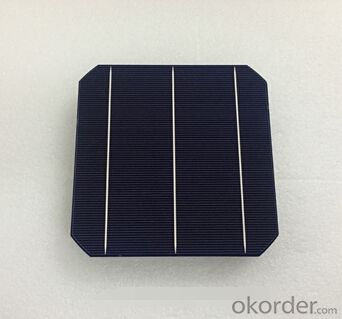
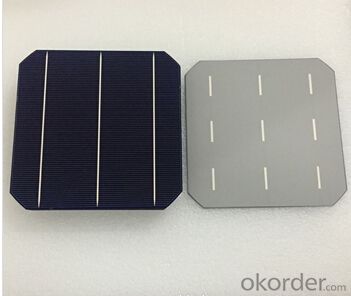
FAQ
We have organized several common questions for our clients,may help you sincerely:
①What price for each watt?
It depends on the efficiency of the solar cell, quantity, delivery date and payment terms.
②How long can we receive the product after purchase?
In the purchase of product within three working days, We will arrange the factory delivery as soon as possible. The pecific time of receiving is related to the state and position of customers.Commonly 7 to 10 working days can be served.
③Can you provide the peripheral products of the solar panels, such as the battery, controller, and inverter? If so, can you tell me how do they match each other?
Yes, we can, we have two companies for solar region, one is CNBM International, the other is CNBM engineering Co.
We can provide you not only the solar module but also the off grid solar system, we can also provide you service with on grid plant.
④What is your warranty of solar cell?
Our product can promise lower than 0.3% open box crack, we support claim after opening the box if it has crackm color difference or sth, the buyer should give pictures immediately, we can not accept the claim after the solar cell has assembled to solar panel.
• Timeliness of delivery
• ⑤How do you pack your products?
We have rich experience on how to pack the solar cell to make sure the safety on shipment, we could use wooden box or pallet as buyer's preference.
⑥ Can you do OEM for us?
Yes, we can.
- Q: Can solar cells be used in smart grid systems?
- Yes, solar cells can be used in smart grid systems. Solar cells can generate electricity from sunlight and can be integrated into the smart grid infrastructure to provide renewable energy sources. This allows for decentralized power generation and can help reduce reliance on traditional energy sources, making the grid more sustainable and efficient. Additionally, smart grid systems can enable the efficient management and distribution of the electricity generated by solar cells, further enhancing their integration into the grid.
- Q: Can solar cells be used for indoor applications?
- Yes, solar cells can be used for indoor applications. While they are primarily designed for outdoor use to harness sunlight, advancements in technology have made it possible to use solar cells indoors as well. Indoor solar cells can be used to power various devices and systems, such as indoor lighting, small electronics, and even indoor farming setups. Additionally, solar cells can also be used in combination with battery storage to provide a continuous and renewable power source for indoor applications.
- Q: What is the role of fuses in solar cell systems?
- The role of fuses in solar cell systems is to protect the system from overcurrent and prevent potential damage to the solar cells and other components. Fuses act as a safety measure by interrupting the circuit in case of excessive current flow, thus preventing overheating and potential hazards such as fires or electrical malfunctions.
- Q: How do solar cells affect property value?
- Solar cells can significantly increase the value of a property. The presence of solar panels not only offers potential savings on energy bills but also demonstrates the property's commitment to sustainability. Studies have shown that homes with solar panels sell faster and at higher prices compared to similar properties without solar installations. Additionally, solar panels can provide a reliable source of income through net metering or feed-in tariffs, further enhancing the property's value.
- Q: Which Solar Panel Type is best? Polycrystalline panel or PV Module Monocrystalline Solar cell panel, or thin film?
- The Monocrystalline silicon solar panels requires less space to operate, so it is one of the best if you don't have a huge space to install it.
- Q: How much do solar cells cost?
- The cost of solar cells can vary depending on various factors such as the type and size of the system, installation requirements, location, and quality of the panels. On average, residential solar panel systems can range from $10,000 to $30,000 or more. However, it is important to consider long-term savings on electricity bills and potential government incentives that can offset the initial investment.
- Q: Can solar cells be used in powering remote monitoring systems?
- Yes, solar cells can be used in powering remote monitoring systems. Solar cells convert sunlight into electricity, making them a sustainable and reliable source of power for remote locations. They can be used to charge batteries that store the energy for continuous operation of monitoring systems, ensuring uninterrupted monitoring even in remote areas with limited access to the power grid.
- Q: Can solar cells be used for hydrogen production?
- Yes, solar cells can be used for hydrogen production through a process called photoelectrolysis, where the energy from sunlight is used to split water molecules into hydrogen and oxygen.
- Q: Can solar cells be used for powering electric gates?
- Yes, solar cells can be used to power electric gates. Solar panels convert sunlight into electricity, which can be used to charge a battery or directly power the gate's motor. This allows the gate to operate without relying on the traditional power grid, making it more environmentally friendly and cost-effective in the long run.
- Q: What is the impact of solar cell installations on greenhouse gas emissions?
- Solar cell installations have a significant positive impact on reducing greenhouse gas emissions. By harnessing clean and renewable energy from the sun, solar cells help to displace the use of fossil fuels, which are major contributors to greenhouse gas emissions. This transition to solar power leads to a decrease in carbon dioxide and other harmful emissions, helping to mitigate climate change and improve air quality.
Send your message to us
Topcon A Grade 16.6% Monocrystalline Solar Cells
- Loading Port:
- Shanghai
- Payment Terms:
- TT OR LC
- Min Order Qty:
- 5000 pc
- Supply Capability:
- 80000 pc/month
OKorder Service Pledge
OKorder Financial Service
Similar products
Hot products
Hot Searches
Related keywords
